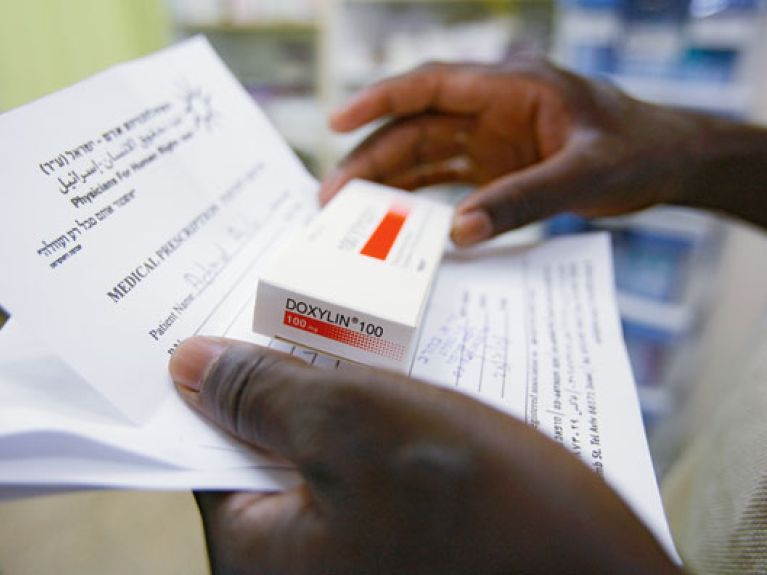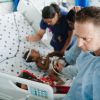Help for refugees in Israel
The work of the Open Clinic in Jaffa also receives support from Germany.

Patients are sitting silently in the waiting room of the Open Clinic in Jaffa. On this particular afternoon, a dozen African migrants have already gathered here to receive free medical treatment because they have no access to regular health care. At around 3 o’clock the doctors and nurses arrive. They provide a service on Sunday, Tuesday and Wednesday – and only leave when the waiting room is empty. Monday is the day for medical specialists. However, patients who want to see an orthopaedist, gynaecologist, diabetes consultant or physiotherapist have to register in advance. The list of voluntary helpers includes around 90 physicians. The clinic, which has been active since 1998, is run by the Israeli non-governmental organisation Physicians for Human Rights (PHR) and treats approximately 6,000 patients a year. Its most prominent active member is Rafi Walden, the 73-year-old professor who was chairman of the organisation until 2015. Walden is the doctor and son-in-law of the former president, Shimon Peres.
PHR is supported by the United Nations Refugee Agency (UNHCR) and, among others, the German aid organisation Medico International based in Frankfurt am Main. In 2012 and 2013 the German Federal Foreign Office also supported the clinic with project funding for human rights work. This is because many of the Africans who are treated at the Open Clinic were victims of serious human rights violations by human traffickers. Many Eritrean refugees have been abducted from refugee camps in Sudan against their will and then subjected to brutal treatment on the Sinai Peninsula to extort ransom money of up to 30,000 dollars from their families. Some 4,000 victims have managed to make their way over the border into Israel after their release or abandonment – mainly in the years between 2007 and 2012.
The Open Clinic moved into its current premises in Jaffa in 2011; before that it was housed at the Central Bus Station in Tel Aviv. In addition to the reception area and three treatment rooms, there is a well-stocked pharmacy, which indicates the most common diseases: pain killers, antibiotics, blood thinners and antidepressants.
Most of the permanent PHR staff members are lawyers and human rights activists who want to change structures. They want to draw attention to the fate of the refugees. It is their goal, says Elisheva Milikovsky of PHR, to extend the right to national basic medical care to those who have previously been excluded. In some respects, their perseverance has already had an impact. Three years ago, the Health Ministry opened an emergency department at Tel Aviv Central Bus Station. And there is an agreement with nearby hospitals to perform a limited number of free blood tests every month.
In addition to immediate medical assistance, the PHR also provides information material in the patients’ languages – and documents their migration stories. This important work has also been funded by the Federal Foreign Office. This has enabled victims of torture and violence to be informed of their rights. Trust is required to allow these stories to come to light. An important intermediary role is played by two interpreters and the Eritrean nun Sister Aziza. Photos of her hang on the walls. Her attention was drawn to a particularly vulnerable group of victims of the human traffickers when there was a strong increase in the demand for abortions, explains Elisheva Milikovsky. She also helped in the production of Sound of Torture, the 2015 prize-winning Israeli documentary that told the refugees’ story. The film has become an important educational tool on the subject of human smuggling and torture. There have been several screenings at the Justice Ministry in Jerusalem. The German Permanent Mission to the United Nations in Geneva showed the film jointly with the Mission of the Netherlands during the 28th session of the Human Rights Council in 2015.
In order to immediately identify people who are the victims of torture, there are small yellow forms at the Open Clinic that are completed when it is suspected this is the case. They ask the following questions: How much time did you spend in Sinai? Did you pay someone there? Were you forced to work in Sinai? Those who are considered victims enjoy special protection, also including psychological support. ▪

